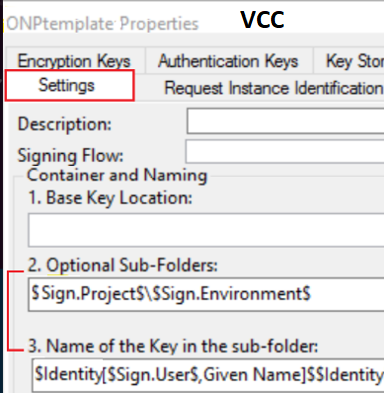POST Codesign/UpdateTemplate
Updates or applies Code Sign Manager - Self-Hosted Environment Template settings. The changes apply to all project environments that use this template.
Requirements
- The template PerUser attribute is already set to true. To set the value, call POST Codesign/CreateTemplate.
- Permissions: The caller must be a Code Signing Administrator.
- Token scope: Codesign:Manage
Headers
-
Content type: Content-Type:application/json.
- Token: The bearer access token that you received. For example, Authorization:Bearer 4MyGeneratedBearerTknz==. For more information, see Passing a bearer token in your API calls.
Parameters
|
Name |
Description |
|---|---|
|
Dn |
The Distinguished Name (DN) of the environment template. Use the appropriate syntax. For example, in Postman: \\VED\\Code Signing\\Environment Templates\\[YourTemplateName]. To get this value, call POST Codesign/EnumerateTemplates. |
|
CertificateTemplate |
Pass one of the following objects with the changes the changes you want:
|
|
ObjectNamingPattern |
Only valid if the template PerUser attribute is already set to true. The pattern that stores signing Certificate objects in the Policy Tree by a user's identity. Each signer has a unique Policy folder. The default is $Sign.Project$\$Sign.Environment$\$Sign.User$.
Example: ObjectNamingPattern: $Sign.Environment$\\$Sign.Project$\\$Identity[$Sign.User$]$ stores certificates in \VED\Policy\Code Signing\Certificates\[ProjectEnvThatUsesThisTemplate]\[Environment]\[user]. The values appear on the CyberArk Configuration Console Template Settings tab. Later, when the Key User signs software, the key and certificate information in the appropriate Policy folder is used. If the folder is missing, it automatically creates Policy folder and cryptographic objects.
|
Returns
|
Name |
Description |
|---|---|
|
HTTP 200 |
For valid requests, this call returns a HTTP 200 message and the following data in the message body:
|
|
HTTP 400 |
For invalid requests, this call returns HTTP 400 Bad Request and the following data in the message body:
|
Example: Apply macros to the template for object naming
Request
POST https://codesign.venafi.example/vedsdk/Codesign/UpdateTemplate Authorization:Bearer 4MyGeneratedBearerTknz==
{
"Dn":"\\VED\\Code Signing\\Environment Templates\\MyTemplate2",
"ObjectNamingPattern":"$Sign.Project$\\$Sign.Environment$\\$Identity[$Sign.User$]$",
"CertificateTemplate":{
"Dn":"\\VED\\Code Signing\\Environment Templates\\MyTemplate2",
...
}
}Response
HTTP/1.1 200 OK
{
"Result": 1,
"Success": true
}
